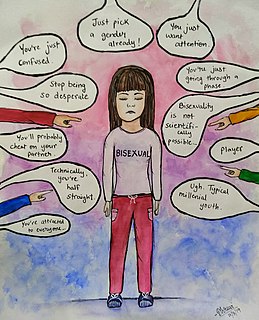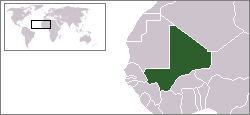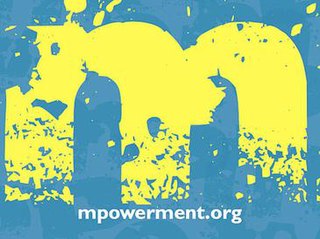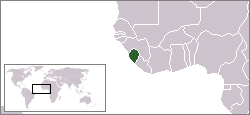Related Research Articles

The AIDS epidemic, caused by HIV, found its way to the United States as early as 1960, but was first noticed after doctors discovered clusters of Kaposi's sarcoma and pneumocystis pneumonia in homosexual men in Los Angeles, New York City, and San Francisco in 1981. Treatment of HIV/AIDS is primarily via a "drug cocktail" of antiretroviral drugs, and education programs to help people avoid infection.

Biphobia is aversion toward bisexuality and bisexual people as individuals. It is a form of homophobia against those in the bisexual community. It can take the form of denial that bisexuality is a genuine sexual orientation, or of negative stereotypes about people who are bisexual. Other forms of biphobia include bisexual erasure.
Down-low is an African-American slang term specifically used within the African-American community that typically refers to a subculture of Black men who usually identify as heterosexual but actively seek sexual encounters and relations with other men, practice gay cruising, and frequently adopt a specific hip-hop attire during these activities. They avoid sharing this information even if they have female sexual partner(s), they are married to a woman, or they are single. The term is also used to refer to a related sexual identity. Down-low has been viewed as "a type of impression management that some of the informants use to present themselves in a manner that is consistent with perceived norms about masculine attribute, attitudes, and behavior".

Lesbian, gay, bisexual, and transgender (LGBT) persons in Mali may face legal challenges not experienced by non-LGBT residents. LGBT persons face stigmatization among the broader population. According to the 2007 Pew Global Attitudes Project, 98 percent of Malian adults believe that homosexuality is a way of life that society should not accept, which was the highest rate of non-acceptance in the 45 countries surveyed.

LGBT marketing is the act of marketing to LGBT customers, either with dedicated ads or general ads, or through sponsorships of LGBT organizations and events, or the targeted use of any other element of the marketing mix.
Same-gender-loving, or SGL, a term coined for African American and African Diaspora use by activist Cleo Manago, is a description for homosexuals and bisexuals in the African American community. It emerged in the early 1990s as a culturally affirming African American homosexual identity.
Joël Gustave Nana Ngongang (1982–2015), frequently known as Joel Nana, was a leading African LGBT human rights advocate and HIV/AIDS activist. Nana's career as a human rights advocate spanned numerous African countries, including Nigeria, Senegal and South Africa, in addition to his native Cameroon. Was the Chief Executive Officer of Partners for Rights and Development (Paridev) a boutique consulting firm on human rights, development and health in Africa at the time of his death. Prior to that position, he was the founding Executive Director of the African Men for Sexual Health and Rights (AMSHeR)an African thought and led coalition of LGBT/MSM organizations working to address the vulnerability of MSM to HIV, Mr Nana worked in various national and international organizations, including the Africa Research and Policy Associate at the International Gay and Lesbian Human Rights Commission(IGLHRC), as a Fellow at Behind the Mask, a Johannesburg-based non-profit media organisation publishing a news website concerning gay and lesbian affairs in Africa, he wrote on numerous topics in the area of African LGBT and HIV/AIDS issues and was a frequent media commentator. Nana on died on October 15, 2015 after a brief illness.

The Rainbow Health Initiative (RHI) is a Minnesota-based organization working to improve the health of the lesbian, gay, bisexual, and transgender (LGBT) Minnesotans through "research, education, and advocacy." Founded in 2001 by physicians and health advocates, RHI has re-framed the discussion of LGBT health in Minnesota from HIV/AIDS to a broader definition of the health disparities affecting LGBT persons. On May 2, 2018, the Rainbow Health Initiative merged with the Minnesota Aids Project to form the newly created Just Us Health.

APLA Health is non-profit organization, whose mission is "to achieve health care equity and promote well-being for the LGBT and other underserved communities and people living with and affected by HIV."

The Mpowerment Project is a model community building and HIV prevention program that has been designed specifically to address the needs of young adult gay/bisexual men ages 18 – 29. It is the first documented HIV prevention intervention for young gay/bisexual men to succeed in reducing sexual risk behavior. The program has been developed, evaluated and continually refined by prominent behavioral scientists from the University of California, San Francisco's Center for AIDS Prevention Studies, the largest research center in the world dedicated to social, behavioral and policy science approaches to HIV.
There are various topics in medicine that particularly relate to lesbian, gay, bisexual, and transgender people. According to the US Gay and Lesbian Medical Association (GLMA), besides HIV/AIDS, issues related to LGBT health include breast and cervical cancer, hepatitis, mental health, substance use disorders, alcohol use, tobacco use, depression, access to care for transgender persons, issues surrounding marriage and family recognition, conversion therapy, refusal clause legislation, and laws that are intended to "immunize health care professionals from liability for discriminating against persons of whom they disapprove."

Lesbian, gay, bisexual, and transgender (LGBT) persons in Sierra Leone face legal challenges not experienced by non-LGBT residents. Male same-sex sexual activity is illegal in Sierra Leone and carries a possible penalty of life imprisonment, although this law is seldom enforced.
Discrimination against people with HIV/AIDS or serophobia is the prejudice, fear, rejection, and stigmatization of people afflicted with HIV/AIDS. Marginalized, at-risk groups such as members of the LGBTQ+ community, intravenous drug users, and sex workers are most vulnerable to facing HIV/AIDS discrimination. The consequences of societal stigma against PLHIV are quite severe, as HIV/AIDS discrimination actively hinders access to HIV/AIDS screening and care around the world. Moreover, these negative stigmas become used against members of the LGBTQ+ community in the form of stereotypes held by physicians.
Aditya Bandopadhyay is a lawyer and LGBTQ rights activist in India, helping to challenge anti-sodomy laws, establishing advocacy organizations and providing legal services to HIV/AIDS organizations.
Since reports of the human immunodeficiency virus (HIV) began to emerge in the United States in the 1980s, the HIV epidemic has frequently been linked to gay, bisexual, and other men who have sex with men (MSM) by epidemiologists and medical professionals. The first official report on the virus was published by the Center for Disease Control (CDC) on June 5, 1981 and detailed the cases of five young gay men who were hospitalized with serious infections. A month later, The New York Times reported that 41 homosexuals had been diagnosed with Kaposi’s Sarcoma, and eight had died less than 24 months after the diagnosis was made. By 1982, the condition was referred to in the medical community as Gay-related immune deficiency (GRID), "gay cancer," and "gay compromise syndrome." It was not until July 1982 that the term Acquired Immune Deficiency Syndrome (AIDS) was suggested to replace GRID, and even then it was not until September that the CDC first used the AIDS acronym in an official report.

Suriname Men United (SMU) is a non-governmental organization (NGO) established under national Surinamese law with the overall objective to improve the well-being of men who have sex with men (MSM) in Suriname. To realize its goal, SMU carries out a variety of activities in the areas of research, prevention, education, psychosocial care, and human rights advocacy.

Gay sexual practices are sexual activities involving men who have sex with men (MSM), regardless of their sexual orientation or sexual identity. These practices can include anal sex, non-penetrative sex, and oral sex. Evidence shows that sex between men is significantly underreported in surveys due to social desirability bias. Some or all sexual activity between men are currently or formerly classified as crimes in some jurisdictions.
Homophobia in ethnic minority communities is any negative prejudice or form of discrimination in ethnic minority communities worldwide towards people who identify as–or are perceived as being–lesbian, gay, bisexual or transgender (LGBT), known as homophobia. This may be expressed as antipathy, contempt, prejudice, aversion, hatred, irrational fear, and is sometimes related to religious beliefs. While religion can have a positive function in many LGB Black and Minority Ethnic (BME) communities, it can also play a role in supporting homophobia.

Domestic violence in same-sex relationships is a pattern of violence or abuse that occurs within same-sex relationships. Domestic violence is an issue that affects people of any sexuality, but there are issues that affect victims of same-sex domestic violence specifically. These issues include homophobia, internalized homophobia, HIV and AIDS stigma, STD risk and other health issues, lack of legal support, and the violence they face being considered less serious than heterosexual domestic violence. Moreover, the issue of domestic violence in same-sex relationships has not been studied as comprehensively as domestic violence in heterosexual relationships. However, there are legal changes being made to help victims of domestic violence in same-sex relationships, as well as organizations that cater specifically to victims of domestic violence in same-sex relationships.

LGBT culture in Baltimore, Maryland is an important part of the culture of Baltimore, as well as being a focal point for the wider LGBT community in the Baltimore metropolitan area. Mount Vernon, known as Baltimore's gay village, is the central hub of the city's lesbian, gay, bisexual, and transgender communities.
References
- ↑ Michael Dresser, "Diverse performers and views honor King ; King honored with diversity; Parade: A variety of groups brave the cold to remember the civil rights leader and advance their causes.", The Baltimore Sun, January 18, 2005.
- ↑ Sean Bugg, "Dan Furmansky and Equality Maryland's growing fight for the state's gay and lesbian community", Metro Weekly, May 18, 2006.
- ↑ Linell Smith, "One More Battle; Gay Boomers, Who Fought Discrimination and Confronted Aids, Face a New Fight as They Grow Old; The Middle Ages; Staying Young, Growing Old and What Happens In Between", The Baltimore Sun, April 1, 2007.
- ↑ "GLBT Centers", Metro Weekly, 2010.
- ↑ Jonathan Bor, "Gay Blacks at Highest Aids Risk: Researchers Seek To Explain Racial Disparity Among Gay, Bisexual Men", The Baltimore Sun, December 4, 2007.
- ↑ "Meet the Newest NHVREI Local Partners", The NIAID HIV Vaccine Research Education Initiative, 2009.
- ↑ "Empowering New Concepts Inc", POZ Magazine, 2010.
- ↑ "PJC Files Brief Supporting Right to Same Sex Marriage in Maryland", June 14, 2005.
- ↑ M. Brooke Murdock-Judge, Gitanjali Deane, et al Plaintiffs v. Frank Conaway, et al Defendants; Circuit Court For Baltimore City, Case No.: 24-C-04-005390.
- ↑ Sue Lin Chong, "The Annie E. Casey Foundation Announces Grants to Help Baltimore Families and Children in 2006: 32 Local Organizations Awarded Funding to Provide Direct Services", October 5, 2005.
- ↑ 2005 BDSG Grantees, page 9, Associated Black Charities, Winter 2005.
- ↑ APHA Scientific Session and Event Listing, "Confronting internalized oppression as a barrier to self-care among Black MSM: The RISE intervention", 3277.1: Monday, November 05, 2007 - Board 5, Abstract #163540.
- ↑ Black Gay Men/MSM and HIV/AIDS: Confronting the Crisis and Planning for Action Meeting Summary, Alexandria, VA, February 4–5, 2008.
- ↑ HIV Trials Vaccine Network. World AIDS Day 2009 event listings.
- ↑ "Meet the Newest NHVREI Local Partners", The NIAID HIV Vaccine Research Education Initiative, 2009.
- ↑ Bradford McIntyre, "HIV Vaccine Awareness Day - 18 May 2010", 2010.
Coordinates: 39°19′04″N76°36′32″W / 39.317848°N 76.608953°W